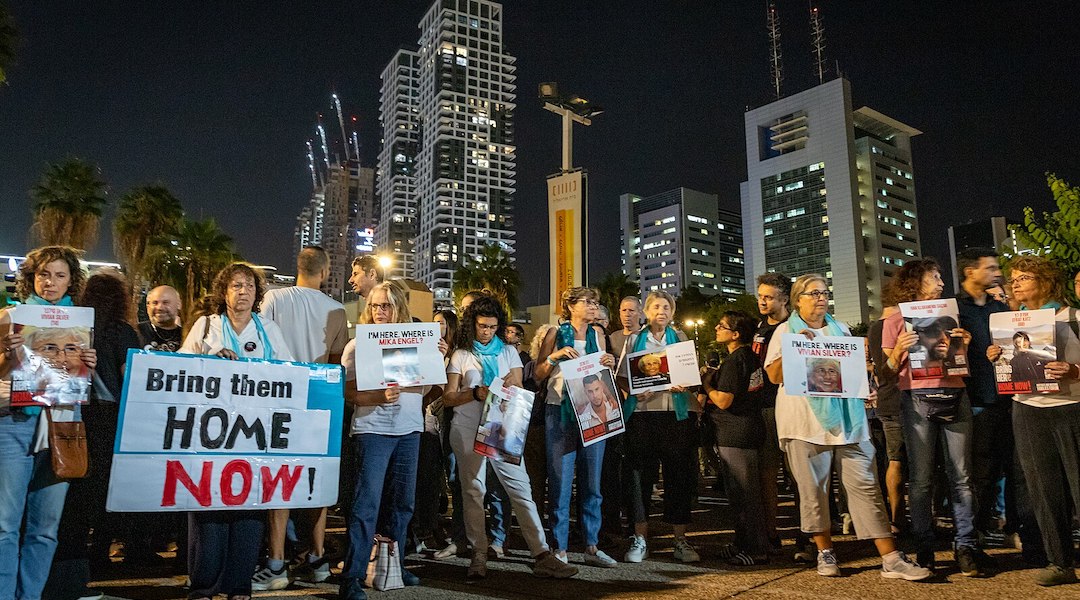(JTA) — In pressing for a deal that could see the release of 50 of the more than 200 hostages held in Gaza in return for a four-day pause in hostilities the release of 150 Palestinian prisoners, Israel’s National Unity Party Minister Benny Gantz described the return of the hostages as a “moral imperative and part of the resilience that enables us to win wars.”
But what if negotiating with Hamas, considered a terrorist group by Israel, creates a dangerous precedent and further encourages its enemies to view hostage-taking as a weapon? By putting its war on Hamas on a four-day hold, does Israel appear to be giving in to an enemy it has vowed to destroy? And by releasing three Palestinian prisoners for every hostage returned, does Israel risk allowing violent prisoners to go free?
These are the unbearable tensions Israeli and American negotiators faced in the leadup to the deal, announced Tuesday night. To understand the dilemmas and pressures Israel is facing, I spoke with law professor Robert Mnookin, director of the Harvard Negotiation Project at Harvard Law School and author of the 2010 book, “Bargaining with the Devil: When to Negotiate, When to Fight.” Mnookin advises governments and corporations on negotiating strategy and conflict resolution and has written about Israel’s controversial hostage swaps with Hamas and other adversaries.
He is also the author, in 2019, of “The Jewish American Paradox: Embracing Choice in a Changing World,” a book about Jewish peoplehood and identity.
We spoke Wednesday about the political pressure on Israel to strike a deal, how religious and national values play a role in hostage negotiations and why a “no-win” scenario is sometimes the best you can do.
The conversation has been edited for length and clarity.
Before we get into the details of this specific hostage exchange, I wonder if you could provide a theoretical framework for hostage negotiation, especially with an enemy deemed terrorists. What should any power consider before embarking on negotiations essentially with kidnappers?
One hard question, of course, is, are they likely to keep to the deal that you make with them? Kidnappers aren’t necessarily a reliable partner to a negotiation.
A second big issue is the question of precedent. What kind of precedent are they setting by being willing to negotiate? For many years, the United States government took the position that it would not negotiate with terrorists to try to release kidnap victims. And there was a lot of tension [between the government and victims’ families]. The stated policy was often informally violated by the U.S. government, that is, they sometimes did participate. And in fact, it turns out that European countries were negotiating with various — often Islamic — terrorist groups in the last decade, were paying money to get people released. The United States wasn’t and it changed its formal policy.
That they would pay ransom?
Not necessarily, but they no longer had an absolute policy that there should not be any contact between the government and terrorist groups with respect to kidnap victims.
You wrote an op-ed critical of the decision in 2011 by an earlier Netanyahu government to release about 1,000 Palestinian prisoners in exchange for Gilad Shalit, an Israeli soldier kidnapped by Hamas in 2006 and held hostage in Gaza. What made you call that a “crazy deal” and what might be different about the current situation?
There were lots of things wrong with that deal. First, the price was absurdly high. Second, it set a terrible precedent. And third, as it turns out, that deal strengthened Hamas and weakened the Palestinian Authority, because the Israeli government was negotiating with Hamas, who made sure the Palestinian Authority would get no credit. And comparatively few of the Palestinian Authority’s prisoners were released. And finally, it turns out of course, that among those released are at least some who now are apparently leaders of Hamas.
On the other hand, obviously, I’m thrilled that Shalit was released.

Robert Mnookin directs the Harvard Negotiation Project at Harvard Law School. (Jon Chase/Harvard University News Office)
When you heard the terms of the deal Tuesday night and Wednesday morning, how did it strike you as someone who has an expertise in negotiations? Was there a winner? Was there a loser?
Well, listen, these kinds of negotiations often involve tragic choices. Who could not be very happy that women and children are being released? On the other hand, while we don’t really know the details of who’s being released by the Israeli government, I gather many of them are minors who participated in rather violent acts or very violent acts.
Should Israel worry that negotiating over hostages in this case is going to encourage its enemies to engage in more kidnapping?
They absolutely should.
Israel has a national ethos of returning its soldiers and protecting its citizens above all else — including by taking actions, like lopsided hostage swaps, that might endanger soldiers and civilians in the future. Do these sort of emotional goals — for the sake of national solidarity or morale, or even the religious imperative of pidyon shvuyim, or redeeming hostages — strike negotiation experts as irrational?
I don’t want to call it irrational because it may reflect and reinforce values that are really quite important. Israel has a tradition that no soldier would be left behind. Given that Israel has an army in which nearly all Jewish people participate, a truly citizens’ army, the Shalit deal was, for all its flaws, a valuable reinforcement of that ideology.
Israel is also a small country, and the degree of separation among its citizens is incredibly small. I imagine that any idea that it won’t negotiate with terrorists is impossible to maintain politically and morally when there are so many stories and they are so personal.
This is something I talked about in my oped many years ago, which is a very important psychological finding that people, in order to save identifiable individuals, are willing to take actions that are far more costly than actions that could save many more unspecified individuals. The classic example of this is when an individual is trapped in a coal mine: It becomes national news, and rescuers might spend millions of dollars to get them out — while the same government authorities are unwilling to spend anywhere near an equivalent amount on safety measures that would ultimately save many more people.
What we’ve seen in Israel, with so many victims, the political pressure is very, very substantial. You’ve seen these posters of all the individual kidnap victims. The families are trying to personalize it — appropriately, because it’s a good strategy. My wife last night was brought to tears with interviews of the family of one of the victims because their story was so sad. There’s this little girl, for example, who’s going to be 4 on her birthday, which is Friday. [Abigail Edan was kidnapped on Oct. 7; Hamas killed her parents, Roy and Smadar Edan; she is a U.S. citizen and President Joe Biden said he expects her to be released.]
Of course a government should be willing to work very hard to get her release. How can you feel they should not do so? These are very hard choices that governments have to face.
What did each side achieve in this deal?
What the Israelis achieved, of course, is that some fraction of the 200-plus hostages are being released and that there are going to be children and women among them. And the suspension of hostilities from Israel’s perspective is comparatively brief. As for Hamas, they’re getting credit for the release, they’re getting a rest in terms of hostilities and there’s going to be substantial humanitarian aid.
The other thing that I think is interesting about this arrangement, of course, in part goes to the reliability issue. They’re doing an arrangement where the hostages are going to be released partially each day, which is a way of reinforcing the ceasefire. Whereas if they were all released right in the beginning, Hamas would be taking the risks that the Israelis might immediately resume hostilities.
Do you accept the idea that a successful negotiation is one in which both sides are disappointed?
No. If the people are rational actors, it should create an outcome that each side views as superior to what their best alternative otherwise would be. Now, it is often the case that the negotiated deal is disappointing in comparison with a perfect world. But on the other hand, almost by definition, if you and I settle a terrible dispute, we wouldn’t have made a deal if we didn’t think it was superior to our expected alternative. And what’s often true is sometimes you and I could settle a conflict with an arrangement that makes us feel positive about doing business together in the future.
JTA has documented Jewish history in real-time for over a century. Keep our journalism strong by joining us in supporting independent, award-winning reporting.







